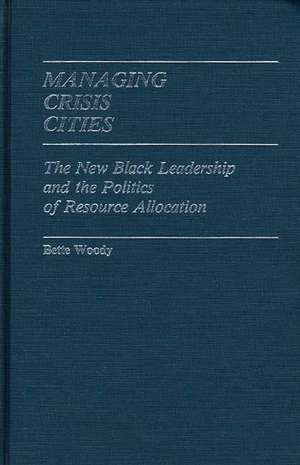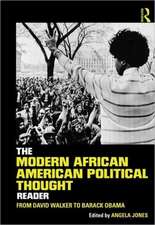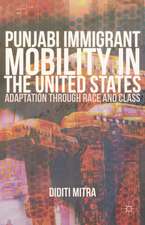Managing Crisis Cities: The New Black Leadership and the Politics of Resource Allocation: Contributions in American Studies,, cartea 82
Autor Bette Woodyen Limba Engleză Hardback – 27 dec 1982
During the past two decades, one of the most significant political and social changes has been the transfer of urban political leadership from aging ethnic-dominated political machines to coalitions led by blacks in cities such as Detroit, Los Angeles, Atlanta, Newark, and New Orleans. Bette Woody's analysis of modern urban government examines the political transformation of the 1970s and 1980s in the context of the failures of machine politics, traditional reforms, and racial policies of the prior two decades. Also discussed is the rise of neighborhood-based political coalitions to support black candidates, business elite support that these new leaders acquired, and the aggressive reform platforms they developed. In analyzing possibilities and strategies for current reform Woody focuses on five black mayors of big cities. A detailed case study of the success and failure of reform during Kenneth Gibson's administration in Newark reveals the importance of reorganizing city agencies and tax and budget structures in successful innovation.
Din seria Contributions in American Studies,
- 38%
 Preț: 438.24 lei
Preț: 438.24 lei - 33%
 Preț: 321.85 lei
Preț: 321.85 lei - 40%
 Preț: 316.13 lei
Preț: 316.13 lei - 39%
 Preț: 433.61 lei
Preț: 433.61 lei - 39%
 Preț: 352.41 lei
Preț: 352.41 lei - 42%
 Preț: 252.48 lei
Preț: 252.48 lei - 43%
 Preț: 268.37 lei
Preț: 268.37 lei - 33%
 Preț: 321.63 lei
Preț: 321.63 lei - 31%
 Preț: 285.27 lei
Preț: 285.27 lei - 28%
 Preț: 404.37 lei
Preț: 404.37 lei - 28%
 Preț: 437.07 lei
Preț: 437.07 lei - 38%
 Preț: 439.01 lei
Preț: 439.01 lei - 51%
 Preț: 252.95 lei
Preț: 252.95 lei - 38%
 Preț: 342.78 lei
Preț: 342.78 lei - 26%
 Preț: 353.63 lei
Preț: 353.63 lei - 38%
 Preț: 346.00 lei
Preț: 346.00 lei - 37%
 Preț: 303.23 lei
Preț: 303.23 lei - 38%
 Preț: 344.98 lei
Preț: 344.98 lei - 38%
 Preț: 439.44 lei
Preț: 439.44 lei - 38%
 Preț: 345.42 lei
Preț: 345.42 lei - 38%
 Preț: 345.42 lei
Preț: 345.42 lei - 18%
 Preț: 321.63 lei
Preț: 321.63 lei - 28%
 Preț: 436.47 lei
Preț: 436.47 lei - 38%
 Preț: 441.04 lei
Preț: 441.04 lei - 52%
 Preț: 250.96 lei
Preț: 250.96 lei - 38%
 Preț: 345.42 lei
Preț: 345.42 lei - 35%
 Preț: 463.55 lei
Preț: 463.55 lei - 38%
 Preț: 436.04 lei
Preț: 436.04 lei - 43%
 Preț: 366.43 lei
Preț: 366.43 lei - 31%
 Preț: 284.80 lei
Preț: 284.80 lei - 38%
 Preț: 437.40 lei
Preț: 437.40 lei - 31%
 Preț: 318.79 lei
Preț: 318.79 lei - 52%
 Preț: 251.04 lei
Preț: 251.04 lei - 33%
 Preț: 319.83 lei
Preț: 319.83 lei - 38%
 Preț: 439.60 lei
Preț: 439.60 lei - 18%
 Preț: 321.63 lei
Preț: 321.63 lei - 38%
 Preț: 439.85 lei
Preț: 439.85 lei
Preț: 437.91 lei
Preț vechi: 707.84 lei
-38% Nou
83.80€ • 90.100$ • 70.40£
Carte tipărită la comandă
Livrare economică 22 aprilie-06 mai
Specificații
ISBN-10: 0313230951
Pagini: 228
Dimensiuni: 156 x 234 x 16 mm
Greutate: 0.53 kg
Editura: Praeger
Colecția Praeger
Seria Contributions in American Studies,











